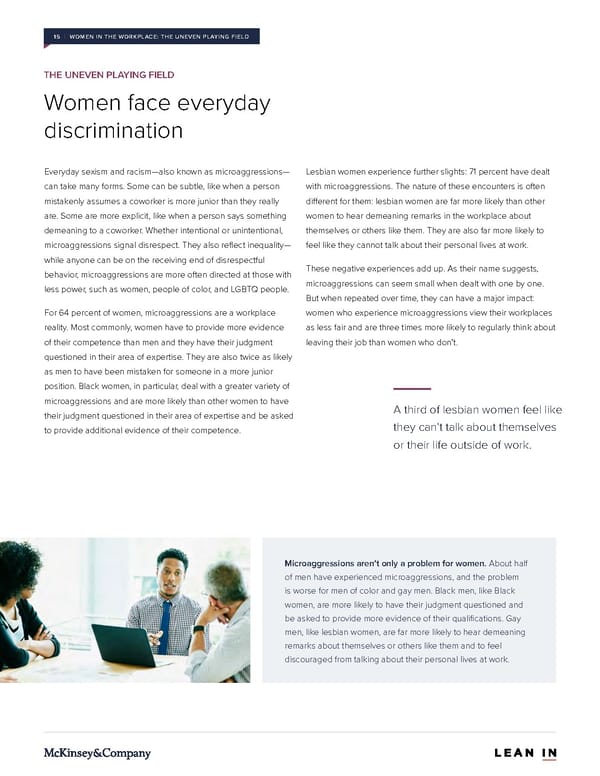15 | WOMEN IN THE WORKPLACE: THE UNEVEN PLAYING FIELD THE UNEVEN PLAYING FIELD Women face everyday discrimination Everyday sexism and racism—also known as microaggressions— Lesbian women experience further slights: 71 percent have dealt can take many forms. Some can be subtle, like when a person with microaggressions. The nature of these encounters is often mistakenly assumes a coworker is more junior than they really different for them: lesbian women are far more likely than other are. Some are more explicit, like when a person says something women to hear demeaning remarks in the workplace about demeaning to a coworker. Whether intentional or unintentional, themselves or others like them. They are also far more likely to microaggressions signal disrespect. They also reflect inequality— feel like they cannot talk about their personal lives at work. while anyone can be on the receiving end of disrespectful behavior, microaggressions are more often directed at those with These negative experiences add up. As their name suggests, less power, such as women, people of color, and LGBTQ people. microaggressions can seem small when dealt with one by one. But when repeated over time, they can have a major impact: For 64 percent of women, microaggressions are a workplace women who experience microaggressions view their workplaces reality. Most commonly, women have to provide more evidence as less fair and are three times more likely to regularly think about of their competence than men and they have their judgment leaving their job than women who don’t. questioned in their area of expertise. They are also twice as likely as men to have been mistaken for someone in a more junior position. Black women, in particular, deal with a greater variety of microaggressions and are more likely than other women to have A third of lesbian women feel like their judgment questioned in their area of expertise and be asked to provide additional evidence of their competence. they can’t talk about themselves or their life outside of work. Microaggressions aren’t only a problem for women. About half of men have experienced microaggressions, and the problem is worse for men of color and gay men. Black men, like Black women, are more likely to have their judgment questioned and be asked to provide more evidence of their qualifications. Gay men, like lesbian women, are far more likely to hear demeaning remarks about themselves or others like them and to feel discouraged from talking about their personal lives at work.
 Women in the Workplace Page 20 Page 22
Women in the Workplace Page 20 Page 22